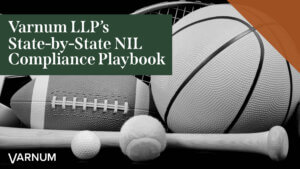More than a year has passed since the NCAA v. Alston ruling and roll-out of the NCAA Name, Image and Likeness Interim Policy. What processes should institutions have in place, and what situations should they be on the lookout for at this point in the NIL game? While institutions cannot provide compensation to student-athletes or potential student-athletes in exchange for use of a student’s NIL, below are items counsel at higher institutions should have on their radar.
Review and Approval of NIL Agreements
The NCAA Interim Policy does not require student-athletes to disclose NIL agreements and/or opportunities to their institutions. In the State of Michigan, however, pursuant to House Bill 5217, beginning December 31, 2022, student-athletes must disclose proposed NIL opportunities or agreements to the institution at least seven days prior to committing to the opportunity or contract. For the institution, this means there needs to be a process in place by which student-athletes submit opportunities or agreements to the institution and the institution does a timely and thorough review of the submission. The institutional representative reviewing the submissions must be knowledgeable of the institution’s active contractual obligations and only sign off on the student-athlete’s potential NIL opportunity or contract once confident there is no conflict with an existing institutional contract. This is most likely to come up in agreements with exclusivity terms, such as sports apparel and campus-wide pouring rights agreements. If there is a conflict, the institution needs to articulate the specific conflict to the student-athlete so they can negotiate a revision, which is then subject to additional review and potential approval by the institution.
Institutions are the Regulating Bodies
Institutions in states that require submission of NIL opportunities by student-athletes need to pay close attention when reviewing submissions because the NCAA has placed most of the NIL regulatory burden on institutions. Specifically, institutions are obligated to report potential violations of NCAA policy. Among other potential violations, institutions must report possible abuses on the prohibition of pay-for-play and improper inducements of potential student-athletes and current student-athletes. Essentially, in addition to spotting potential conflicts between NIL agreements and current institution agreements, institutions need to review NIL agreements to determine if a student-athlete is being compensated for athletic achievement and/or for their enrollment or continued enrollment at a particular institution. Any indication that the student-athlete’s NIL agreement will be void if they no longer participate on an athletic team requires the institution to complete due diligence and determine the appropriateness of the arrangement in light of the NIL policy. Institutions are ultimately responsible for certifying the eligibility of student-athletes, and the presence of the previously mentioned terms place the agreement in direct violation of the language in the NIL Interim Policy and corresponding NCAA guidance.
Institutional Staff Members
It is in the best interest of institutions to train their staff members on appropriate interactions with boosters because the NCAA holds institutions responsible for the “impermissible recruiting activities engaged in by a representative of athletics interest (i.e., a booster).” Staff members need to understand the actions they are permitted to take and conversations they are permitted to have, as failure to do so could land them deep in the gray area of NIL.
- An institutional staff member cannot directly or indirectly communicate with a potential student-athlete on behalf of a booster or NIL entity.
- An institutional staff member cannot enter into agreements with an NIL entity to secure NIL deals between the entity and potential student-athletes.
- An institutional staff member cannot “organize, facilitate or arrange” a meeting or any conversations between an NIL entity and a potential student-athlete, which includes transfer students coming from other institutions.
Financial Aid
Institutions should ensure they are not influencing how a student-athlete uses their compensation. Specifically, institutions should not direct student-athletes to use their NIL compensation for financial aid. Student-athletes’ financial aid is not impacted by compensation they would receive from NIL agreements. Financial aid limitations exclude compensation which also extends to NIL compensation. However, if a student receives NIL compensation, this may impact need-based financial aid.
FERPA
Many public institutions have made the argument that FERPA precludes them from disclosing NIL agreements without a release executed by the student-athlete. If a copy of an NIL agreement or summary of an NIL opportunity is provided to the institution by the student-athlete, this becomes a record of the university per the definition of FERPA and is likely part of the student-athlete’s educational record. There may be a particular circumstance in which a FERPA exception would apply to a request, but there is no broad FERPA exception that would apply in this situation. Institutions might find it strategic to include their stance on FERPA in an NIL policy to ensure all requests for NIL agreements are handled consistently.
International Students
International students can receive NIL compensation but with some caveats. In its documentation, the NCAA directs international student-athletes to their institution’s Designated School Official for “guidance related to maintaining their immigration status and tax implications.” As a result, institutions should make sure the individual(s) is/are well equipped to provide answers regarding NIL from international students.
Five Steps to Become a Well-Organized and Compliant Institution
- Have an NIL policy and procedures that are followed consistently and made available to student-athletes for reference and consultation;
- Have a process in place to review NIL agreements between the institution’s student-athletes and outside entities or individuals (if located in a state that requires student-athletes to make such disclosures);
- Have trained its staff (especially athletics staff) on what actions can and cannot be taken in relation to student-athletes’ NIL opportunities;
- Have trained its student-athletes on available resources; and
- Have a team of institutional staff members ready to pivot if additional laws are enacted by their state, if additional guidance is provided by the NCAA or if federal legislation is enacted.
Varnum’s team of experienced practitioners continually monitors NIL activity at the federal, state and institutional levels. Contact a member of our team for additional insight.
Free Download
To aid individuals, schools and collectives with the often inconsistent and rapidly developing legislative and executive actions of the states, Varnum’s dedicated team of NIL attorneys created an all-inclusive, state-by-state compliance playbook. Learn more and download your free copy: www.varnumlaw.com/state-by-state-nil-compliance-guide/


